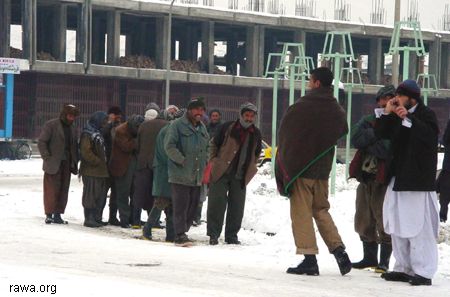HERAT, Afghanistan -- Promises of work and security made Ghulam Hazara return to this western Afghan city from Iran two years ago. Now a lack of both is driving him back.
"I heard the situation had improved in Afghanistan, and it would be good to be near my family again," Hazara said as he squatted in the shade of towering pine trees outside the Iranian consulate with at least 400 other men.
"But now I feel there is nothing here, and I have to go back to work in Iran," the 44-year-old Afghan said.

RAWA Photo: Those refugees returned from Pakistan and Iran are mostly jobless and line up in the main squares of Kabul in search of any job. To feed their children, many of them are ready to do any job to make a living. They are best preys for warlords to employ them for their sinister businesses including drug cultivation and trafficking.
Afghan expectations for a better life soared after U.S.-led forces ousted the Taliban for sheltering Osama bin Laden. But more than four years later, the impoverished nation cannot provide work for millions of its own, and Taliban-led violence hinders development and claims lives. That makes returning an unattractive option for the roughly 4 million registered Afghan refugees living in Iran and Pakistan.
Just over 1,000 of the 900,000 Afghan refugees in Iran have returned this year, the U.N. says, a trickle compared to the 65,000 who came back in 2005. Some 375,000 returned in 2004 amid an Iranian campaign to limit health care and education for Afghans in a bid to get them to leave.
About 25,000 have returned this year from Pakistan, some of them forced out after Pakistani officials closed several refugee camps near the border. The closures sparked a U.N. protest.
Some 3 million still live in Pakistani border regions, and in cities like Quetta and Peshawar. Half were born in Pakistan, but are unable to get citizenship.
"We have to be realistic about the refugee situations in both countries because we can't solve the problem in solely a refugees context," said Keisuke Murata, deputy representative for the U.N. High Commissioner for Refugees in Afghanistan.
"We are advocating better population management and providing visas for Afghans to legitimately work in Iran or Pakistan," Murata said.
Pakistan and Iran have been pushing for Afghanistan to take back more refugees, who fled decades of war, including the Soviet invasion, the four-year civil war of the 1990s and later fighting between the Taliban and Northern Alliance rebels.
President Hamid Karzai has repeatedly urged the millions living outside Afghanistan to return and help rebuild the country. But officials acknowledge they have a limited ability to help returnees.
"But we have difficulties providing shelter and work for all the refugees living outside," said Refugee Ministry spokesman Nadim Jan. "We also are not yet to solve our problems with health, school and agricultural services, while of course security remains a big issue."
Afghanistan has some 25 million people; the country's unemployment rate is 40 percent, according to a CIA World Factbook estimate.
Violence is restricting development in many parts of the country, cutting off work opportunities for Afghans. And a debilitating drought has forced farmers into cities like Herat and the capital, Kabul, in search of work.
A succession of natural and manmade disasters, from the South Asian tsunami and the Pakistan earthquake to the war in Iraq, has meant donors have less money for Afghanistan.
"Yes, definitely there is donor fatigue," says Rahilla Zafar, spokeswoman for the International Office of Migration.
An example is the cut in aid to some 15,000 Afghans from neighboring provinces like Badghis and Ghor now living in the sprawling Maslakh camp on Herat's outskirts.
The International Office of Migration says international aid has effectively stopped for people at Maslakh. Camp residents say it ended long ago.
"We don't have schools, land or work," said white-bearded camp elder Ghulam Farouk, 65, who moved here seven years ago. "We want the government to help us, but if they don't we will continue to look after ourselves. We have no other choice."



